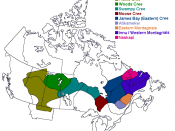Native history forms an important and distinct part of Canadian society. The history of relations between First Nations peoples of Canada and the European settlers that arrived on this country's shores extends over five centuries. Between 1725 and 1923 treaties were signed between the crown and several of the Indian tribes and nations living in what was to become Canada. Today these treaties are known as historic Indian treaties. From the beginning, treaties have been an important aspect of the relationship between the Crown and Aboriginal people. It is a myth that is perpetuated by many historians that the Canadian government was paternalistic and farsighted when dealing with the Plains Indians between 1870-1885 , at least in the sense of looking out for their best interests. On the contrary, the lavish promises entailed in the treaties made by the white man to induce Natives to surrender their land actually contributed to the demise of Native culture.
A false and blind sense of idealism motivated the Canadian government when it dealt with treaty negotiations. It is also a misconception that the treaties made were fair. This is most evident in the treaties concerning the Plains Cree. Before these treaties were made the Cree were a self-sustaining nation with their own forms of government as well as cultural and social realms. Afterward, the Treaties and the reservation system that they spawned would create a great divide in future relations between First Nations peoples and Canadian society.
The Canadian government did not see treaties as a means for Natives to become civilized and assimilated into white society through the implementation of reserves. The Cree are said to be a primitive people that followed an inflexible system of tradition and custom, seeking to protect themselves against the advance of civilization. This traditional...


